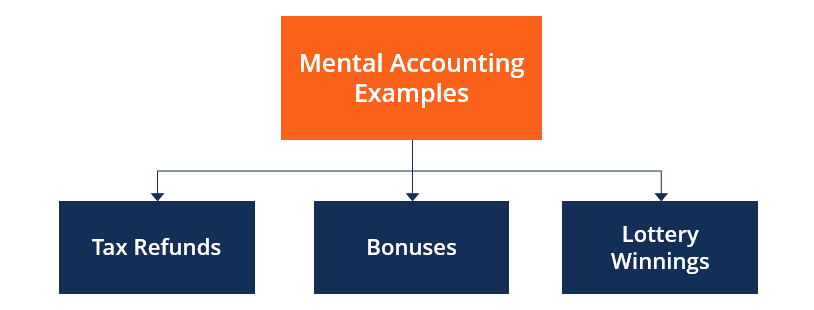Which Of The Following Is An Example Of Consumers Failing To Treat Money As Fungible?
What is Mental Accounting?
The mental accounting concept was introduced by Richard Thaler in a paper titled "Mental Accounting Matters," which was published in the Periodical of Behavioral Decision Making. Thaler noted that people place the value of money differently, and it exposes them to irrational decision-making. In elementary terms, the concept states that individuals classify money differently based on subjective criteria, and it frequently leads people to make irrational spending and financially counterproductive investment decisions.

The concept suggests that people practise not treat money every bit fungible – i.e., mutually interchangeable – and instead, link their spending to particular budgets. For example, if an individual is paid an end-twelvemonth bonus of $i,000 for exemplary performance, they may feel that the bonus allows them to spend coin on improvident items, such equally meals, lavish vacations, and other expenses that they would never justify spending regular income on. The concept holds that people are more likely to be impulsive with unexpected money because such coin was not factored in their financial plan.
Summary
- Mental accounting is a behavioral economics concept that states that humans place different values on money, which leads to irrational decision making.
- The concept of mental bookkeeping was adult by Richard Thaler in 1999.
- Thaler recommended that people should care for money as a fungible article and care for all money the same, regardless of its origin or employ.
How It Works
The concept of mental bookkeeping was introduced in 1999 by Richard Thaler, a professor of Economics at the Academy of Chicago'south Booth School of Business. The concept was published in a paper titled "Mental Accounting Matters," and Thaler detailed how mental bookkeeping leads people to make irrational spending and investment decisions. He divers mental accounting as a ready of cerebral operations that individuals use to go on track of financial activities .
In debunking the mental accounting theory, Thaler emphasized the concept of fungibility. The concept holds that all coin is mutually exchangeable and that individuals should treat all coin the aforementioned, regardless of the intended utilise or origin.
Thaler observed that people oft violated the fungibility concept when dealing with a windfall situation such equally bonuses, tax refunds, lottery winnings, and birthday money. It ways that "souvenir money" that is not part of the individual's regular income is spent in extravagant expenses that they cannot justify. Therefore, he advised that individuals should treat all coin the same and spend windfalls the same way they spend regular income based on a solid fiscal programme.
Examples of Mental Accounting
The following are common examples of mental accounting:

Tax Refunds
A tax refund is a reimbursement of the excess corporeality of revenue enhancement paid past a taxpayer to the federal or state government. If a taxpayer receives a refund, it ways they overpaid their taxes in the previous tax yr, and this represents an interest-free loan to the regime.
Nigh taxpayers look at tax refunds as a bonus or sort of windfall whose spending has no touch on their financial plan for the year. It is erroneous since tax refunds represent money that rightfully belongs to the taxpayer, and the tax dominance merely restores an amount equivalent to the overpaid taxation. Instead, tax refunds should be treated as a fungible commodity regardless of its origin, and it should be treated the same way equally regular income.
Bonuses
A bonus is a payment to a person in a higher place and beyond their regular income. Normally, bonuses are awarded equally a form of incentive to entry-level and senior-level employees. Companies likewise employ bonuses to reward special achievements or for the achievement of sure milestones.
However, employees come across bonuses in a different light other than mere ordinary income. Equally a result, many employees spend their bonuses on unnecessary expenses such as cars, vacations, fancy wearable, etc.
Such spending beliefs is against the concept of fungibility. Before spending bonuses on extravagant expenses, employees should compare the expenses with what that the money could alternatively exist spent on – something that is more deserving of that coin.
Lottery Winnings
Lottery winners often spend their fortunes on dubious purchases that are only justified past the unmerited prize they won. Equally a result, many lottery winners become bankrupt before long afterward receiving their prize and spending their fortune on undeserving expenses.
If the fortune had been spent in line with the financial program that the winners had before the win, they would've earned returns on their investments or spent the fortune on justifiable expenses.
Mental Accounting in Investing
Mental bookkeeping also exists in investing, every bit investors choose the avails to invest in speculative and safe portfolios. Investors disassociate condom portfolios from speculative portfolios so that negative returns from the latter practice not affect positive returns from the quondam. Information technology ways that there is extra money that investors can afford to lose and that they are comfortable investing in uncertain and speculative investments.
Withal, "money that you can afford to lose" is a mental accounting bias, since all coin is the same, and in that location is no decision that would justify losing any money yous own. At that place should be no division between safety capital letter and money that you tin afford to lose, and any dividing line amounts to a mental illusion.
Additional Resources
CFI is the official provider of the global Commercial Banking & Credit Annotator (CBCA)™ certification program, designed to aid anyone become a earth-course fiscal analyst. To keep advancing your career, the additional resource below volition be useful:
- Decision Theory
- Moral Hazard
- Prisoner'southward Dilemma
- Investing: A Beginner'southward Guide
Source: https://corporatefinanceinstitute.com/resources/careers/soft-skills/mental-accounting/
Posted by: olsonsiblen.blogspot.com

0 Response to "Which Of The Following Is An Example Of Consumers Failing To Treat Money As Fungible?"
Post a Comment